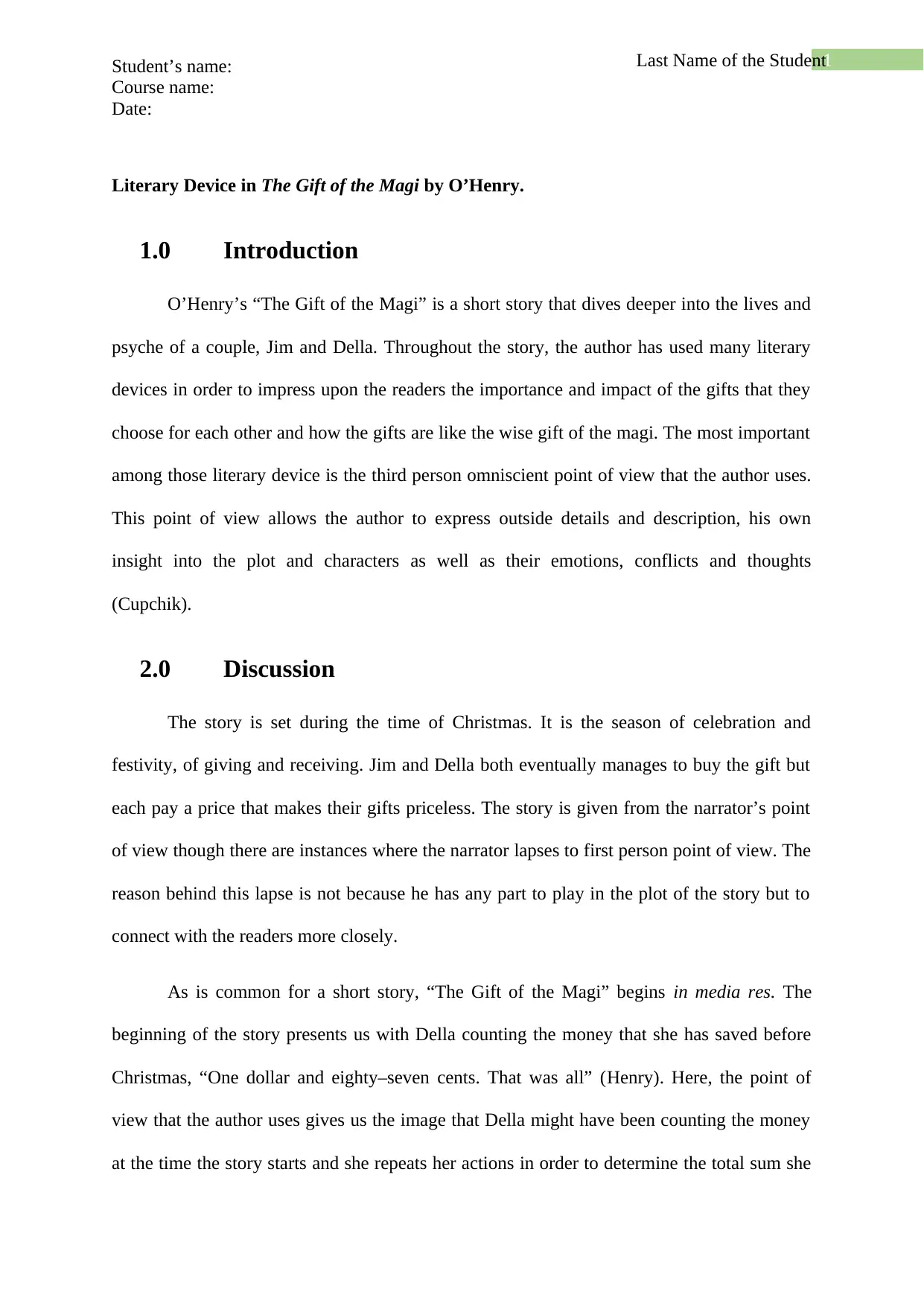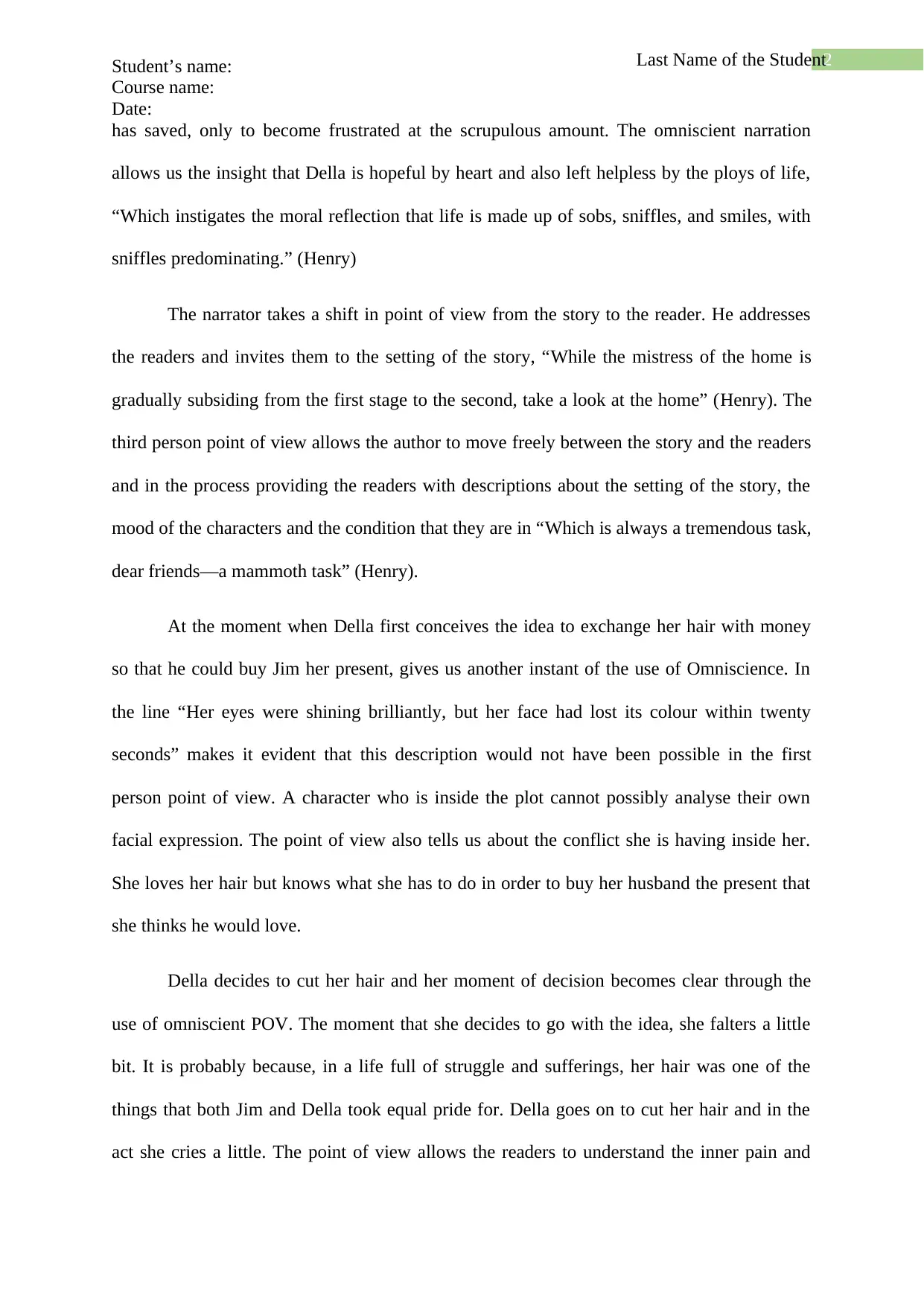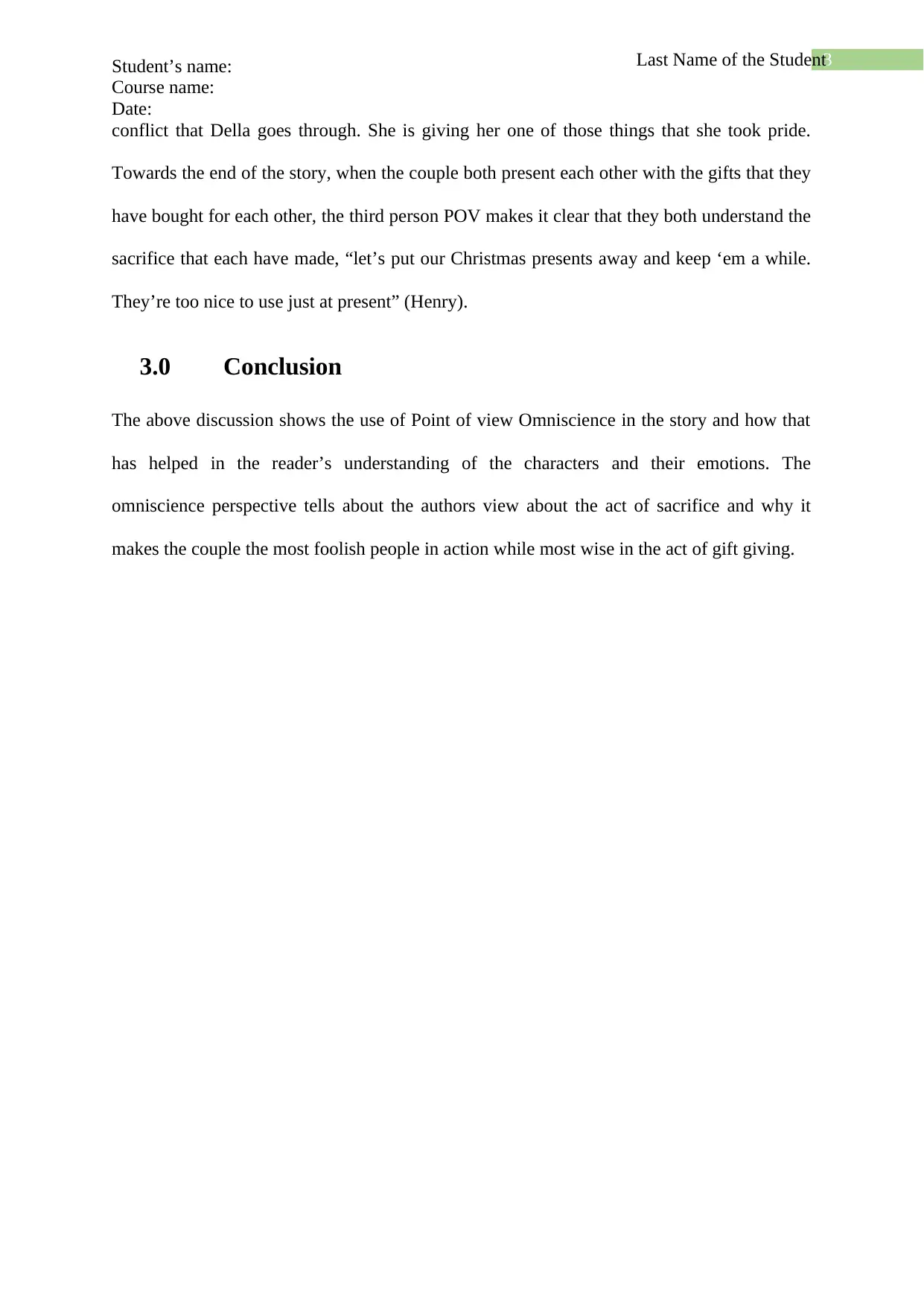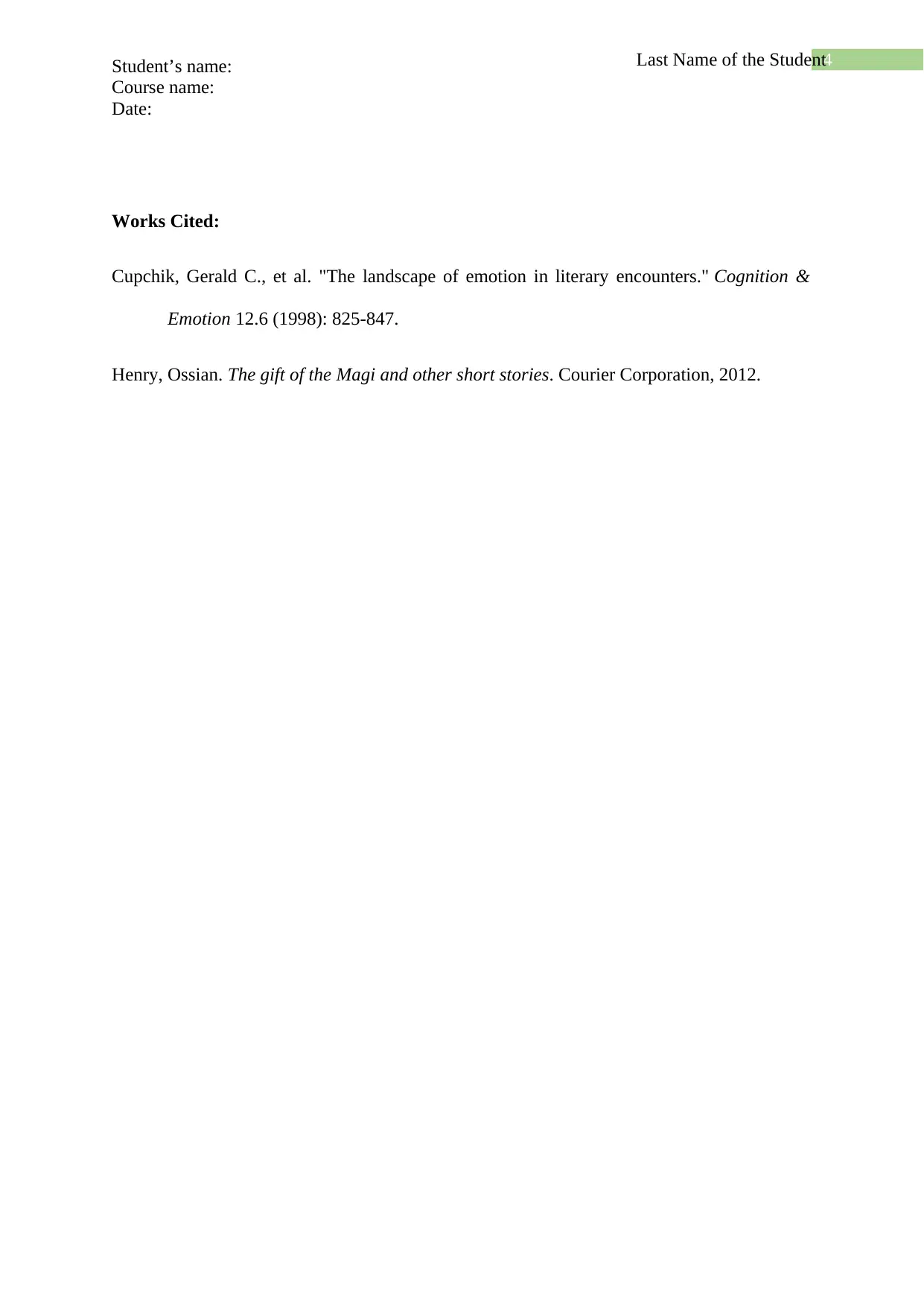Course Name: Literary Devices in O'Henry's The Gift of the Magi Essay
VerifiedAdded on 2022/12/23
|4
|1032
|97
Essay
AI Summary
This essay delves into the literary devices employed by O. Henry in his short story, 'The Gift of the Magi,' with a primary focus on the use of the third-person omniscient point of view. The analysis explores how this narrative perspective allows the author to convey the characters' emotions, thoughts, and conflicts, providing insights into the sacrifices made by Jim and Della. The essay examines how the narrator's voice enhances the reader's understanding of the story's setting, mood, and the couple's internal struggles, especially during the Christmas season. The discussion highlights specific instances where the omniscient point of view reveals Della's internal conflict and the couple's mutual understanding of their sacrifices, emphasizing the story's theme of selfless love and the irony of their gifts.

1Last Name of the StudentStudent’s name:
Course name:
Date:
Literary Device in The Gift of the Magi by O’Henry.
1.0 Introduction
O’Henry’s “The Gift of the Magi” is a short story that dives deeper into the lives and
psyche of a couple, Jim and Della. Throughout the story, the author has used many literary
devices in order to impress upon the readers the importance and impact of the gifts that they
choose for each other and how the gifts are like the wise gift of the magi. The most important
among those literary device is the third person omniscient point of view that the author uses.
This point of view allows the author to express outside details and description, his own
insight into the plot and characters as well as their emotions, conflicts and thoughts
(Cupchik).
2.0 Discussion
The story is set during the time of Christmas. It is the season of celebration and
festivity, of giving and receiving. Jim and Della both eventually manages to buy the gift but
each pay a price that makes their gifts priceless. The story is given from the narrator’s point
of view though there are instances where the narrator lapses to first person point of view. The
reason behind this lapse is not because he has any part to play in the plot of the story but to
connect with the readers more closely.
As is common for a short story, “The Gift of the Magi” begins in media res. The
beginning of the story presents us with Della counting the money that she has saved before
Christmas, “One dollar and eighty–seven cents. That was all” (Henry). Here, the point of
view that the author uses gives us the image that Della might have been counting the money
at the time the story starts and she repeats her actions in order to determine the total sum she
Course name:
Date:
Literary Device in The Gift of the Magi by O’Henry.
1.0 Introduction
O’Henry’s “The Gift of the Magi” is a short story that dives deeper into the lives and
psyche of a couple, Jim and Della. Throughout the story, the author has used many literary
devices in order to impress upon the readers the importance and impact of the gifts that they
choose for each other and how the gifts are like the wise gift of the magi. The most important
among those literary device is the third person omniscient point of view that the author uses.
This point of view allows the author to express outside details and description, his own
insight into the plot and characters as well as their emotions, conflicts and thoughts
(Cupchik).
2.0 Discussion
The story is set during the time of Christmas. It is the season of celebration and
festivity, of giving and receiving. Jim and Della both eventually manages to buy the gift but
each pay a price that makes their gifts priceless. The story is given from the narrator’s point
of view though there are instances where the narrator lapses to first person point of view. The
reason behind this lapse is not because he has any part to play in the plot of the story but to
connect with the readers more closely.
As is common for a short story, “The Gift of the Magi” begins in media res. The
beginning of the story presents us with Della counting the money that she has saved before
Christmas, “One dollar and eighty–seven cents. That was all” (Henry). Here, the point of
view that the author uses gives us the image that Della might have been counting the money
at the time the story starts and she repeats her actions in order to determine the total sum she
Paraphrase This Document
Need a fresh take? Get an instant paraphrase of this document with our AI Paraphraser

2Last Name of the StudentStudent’s name:
Course name:
Date:
has saved, only to become frustrated at the scrupulous amount. The omniscient narration
allows us the insight that Della is hopeful by heart and also left helpless by the ploys of life,
“Which instigates the moral reflection that life is made up of sobs, sniffles, and smiles, with
sniffles predominating.” (Henry)
The narrator takes a shift in point of view from the story to the reader. He addresses
the readers and invites them to the setting of the story, “While the mistress of the home is
gradually subsiding from the first stage to the second, take a look at the home” (Henry). The
third person point of view allows the author to move freely between the story and the readers
and in the process providing the readers with descriptions about the setting of the story, the
mood of the characters and the condition that they are in “Which is always a tremendous task,
dear friends—a mammoth task” (Henry).
At the moment when Della first conceives the idea to exchange her hair with money
so that he could buy Jim her present, gives us another instant of the use of Omniscience. In
the line “Her eyes were shining brilliantly, but her face had lost its colour within twenty
seconds” makes it evident that this description would not have been possible in the first
person point of view. A character who is inside the plot cannot possibly analyse their own
facial expression. The point of view also tells us about the conflict she is having inside her.
She loves her hair but knows what she has to do in order to buy her husband the present that
she thinks he would love.
Della decides to cut her hair and her moment of decision becomes clear through the
use of omniscient POV. The moment that she decides to go with the idea, she falters a little
bit. It is probably because, in a life full of struggle and sufferings, her hair was one of the
things that both Jim and Della took equal pride for. Della goes on to cut her hair and in the
act she cries a little. The point of view allows the readers to understand the inner pain and
Course name:
Date:
has saved, only to become frustrated at the scrupulous amount. The omniscient narration
allows us the insight that Della is hopeful by heart and also left helpless by the ploys of life,
“Which instigates the moral reflection that life is made up of sobs, sniffles, and smiles, with
sniffles predominating.” (Henry)
The narrator takes a shift in point of view from the story to the reader. He addresses
the readers and invites them to the setting of the story, “While the mistress of the home is
gradually subsiding from the first stage to the second, take a look at the home” (Henry). The
third person point of view allows the author to move freely between the story and the readers
and in the process providing the readers with descriptions about the setting of the story, the
mood of the characters and the condition that they are in “Which is always a tremendous task,
dear friends—a mammoth task” (Henry).
At the moment when Della first conceives the idea to exchange her hair with money
so that he could buy Jim her present, gives us another instant of the use of Omniscience. In
the line “Her eyes were shining brilliantly, but her face had lost its colour within twenty
seconds” makes it evident that this description would not have been possible in the first
person point of view. A character who is inside the plot cannot possibly analyse their own
facial expression. The point of view also tells us about the conflict she is having inside her.
She loves her hair but knows what she has to do in order to buy her husband the present that
she thinks he would love.
Della decides to cut her hair and her moment of decision becomes clear through the
use of omniscient POV. The moment that she decides to go with the idea, she falters a little
bit. It is probably because, in a life full of struggle and sufferings, her hair was one of the
things that both Jim and Della took equal pride for. Della goes on to cut her hair and in the
act she cries a little. The point of view allows the readers to understand the inner pain and

3Last Name of the StudentStudent’s name:
Course name:
Date:
conflict that Della goes through. She is giving her one of those things that she took pride.
Towards the end of the story, when the couple both present each other with the gifts that they
have bought for each other, the third person POV makes it clear that they both understand the
sacrifice that each have made, “let’s put our Christmas presents away and keep ‘em a while.
They’re too nice to use just at present” (Henry).
3.0 Conclusion
The above discussion shows the use of Point of view Omniscience in the story and how that
has helped in the reader’s understanding of the characters and their emotions. The
omniscience perspective tells about the authors view about the act of sacrifice and why it
makes the couple the most foolish people in action while most wise in the act of gift giving.
Course name:
Date:
conflict that Della goes through. She is giving her one of those things that she took pride.
Towards the end of the story, when the couple both present each other with the gifts that they
have bought for each other, the third person POV makes it clear that they both understand the
sacrifice that each have made, “let’s put our Christmas presents away and keep ‘em a while.
They’re too nice to use just at present” (Henry).
3.0 Conclusion
The above discussion shows the use of Point of view Omniscience in the story and how that
has helped in the reader’s understanding of the characters and their emotions. The
omniscience perspective tells about the authors view about the act of sacrifice and why it
makes the couple the most foolish people in action while most wise in the act of gift giving.
⊘ This is a preview!⊘
Do you want full access?
Subscribe today to unlock all pages.

Trusted by 1+ million students worldwide

4Last Name of the StudentStudent’s name:
Course name:
Date:
Works Cited:
Cupchik, Gerald C., et al. "The landscape of emotion in literary encounters." Cognition &
Emotion 12.6 (1998): 825-847.
Henry, Ossian. The gift of the Magi and other short stories. Courier Corporation, 2012.
Course name:
Date:
Works Cited:
Cupchik, Gerald C., et al. "The landscape of emotion in literary encounters." Cognition &
Emotion 12.6 (1998): 825-847.
Henry, Ossian. The gift of the Magi and other short stories. Courier Corporation, 2012.
1 out of 4
Related Documents
Your All-in-One AI-Powered Toolkit for Academic Success.
+13062052269
info@desklib.com
Available 24*7 on WhatsApp / Email
![[object Object]](/_next/static/media/star-bottom.7253800d.svg)
Unlock your academic potential
Copyright © 2020–2025 A2Z Services. All Rights Reserved. Developed and managed by ZUCOL.





